-
 Bitcoin
Bitcoin $83,649.7703
-1.06% -
 Ethereum
Ethereum $1,818.4708
-2.72% -
 Tether USDt
Tether USDt $1.0000
0.01% -
 XRP
XRP $2.0495
-3.21% -
 BNB
BNB $597.8591
-1.20% -
 Solana
Solana $118.6021
-5.26% -
 USDC
USDC $1.0000
0.01% -
 Dogecoin
Dogecoin $0.1642
-3.52% -
 Cardano
Cardano $0.6526
-2.99% -
 TRON
TRON $0.2343
-0.56% -
 Toncoin
Toncoin $3.7346
-7.00% -
 UNUS SED LEO
UNUS SED LEO $9.4260
0.63% -
 Chainlink
Chainlink $12.9796
-3.63% -
 Stellar
Stellar $0.2617
-1.79% -
 Avalanche
Avalanche $18.3920
-4.15% -
 Sui
Sui $2.3105
-2.61% -
 Shiba Inu
Shiba Inu $0.0...01222
-0.74% -
 Hedera
Hedera $0.1630
-1.67% -
 Litecoin
Litecoin $83.6143
1.85% -
 Polkadot
Polkadot $4.0068
-2.05% -
 MANTRA
MANTRA $6.3564
2.37% -
 Bitcoin Cash
Bitcoin Cash $306.7380
0.76% -
 Bitget Token
Bitget Token $4.5736
-0.36% -
 Dai
Dai $1.0001
0.01% -
 Ethena USDe
Ethena USDe $0.9998
0.00% -
 Pi
Pi $0.6284
-6.81% -
 Hyperliquid
Hyperliquid $11.9330
-10.11% -
 Monero
Monero $213.7810
-0.49% -
 Uniswap
Uniswap $5.9757
-2.02% -
 Aptos
Aptos $5.2294
-1.01%
What is the liquidity of Bitcoin ETF in the Chinese market?
No Bitcoin ETFs exist in China, but if approved, factors like regulatory framework, market infrastructure, and investor sentiment would impact their liquidity.
Mar 29, 2025 at 11:57 am
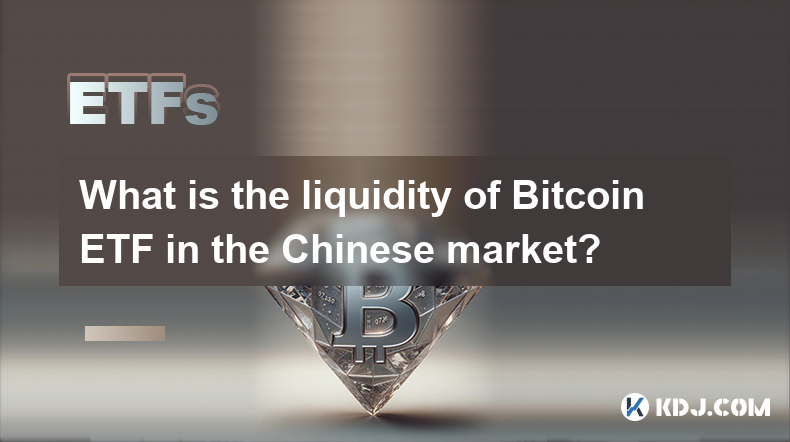
Understanding Bitcoin ETF Liquidity in a Non-Existent Market
The question of Bitcoin ETF liquidity in the Chinese market is inherently complex because there are currently no Bitcoin ETFs officially approved or traded within mainland China. This lack of regulatory approval significantly impacts the potential liquidity discussion. Any discussion of liquidity must therefore be framed within the context of hypothetical scenarios or the activities of Chinese investors in offshore markets.
Hypothetical Liquidity Scenarios
If a Bitcoin ETF were approved in China, several factors would influence its liquidity. The size of the ETF, the number of participating market makers, and the overall trading volume would all play crucial roles. A larger ETF with many active market makers would generally be considered more liquid, allowing investors to buy and sell shares easily without significantly impacting the price. Conversely, a smaller ETF with limited market participation could experience significant price slippage and difficulty in executing trades.
The demand from Chinese investors would also be a key driver of liquidity. China has a large and growing population of cryptocurrency investors, many of whom currently participate in overseas markets. If a domestically available ETF were offered, it could attract substantial investment, potentially leading to high liquidity. However, the regulatory environment and investor sentiment would significantly affect this demand. Government policies and any associated risks could dampen enthusiasm and reduce trading activity.
Offshore Trading and its Implications
Chinese investors currently access Bitcoin through various offshore exchanges and over-the-counter (OTC) markets. The liquidity in these markets can vary considerably. While some large international exchanges offer substantial liquidity, smaller or less regulated platforms might have limited trading volumes and higher price volatility. The liquidity experienced by Chinese investors in these offshore markets doesn't directly translate to the liquidity of a hypothetical domestic Bitcoin ETF.
The accessibility and ease of use of these offshore platforms also play a role. Government restrictions on capital outflow and the complexities of international transactions can limit the participation of some investors, affecting the overall liquidity observed. These limitations highlight the significant difference between trading Bitcoin indirectly through offshore avenues and directly through a regulated domestic ETF.
Factors Affecting Hypothetical Liquidity
Several factors would determine the liquidity of a hypothetical Bitcoin ETF in China:
Regulatory Framework: A clear and supportive regulatory framework would encourage institutional and retail participation, boosting liquidity. Conversely, strict regulations or uncertainties could stifle trading activity.
Market Infrastructure: The availability of robust trading platforms, clearing houses, and market makers is crucial for efficient trading and high liquidity. The development of these infrastructures would take time and significant investment.
Investor Education and Awareness: Greater investor understanding of Bitcoin and ETFs would increase demand and participation, thereby enhancing liquidity. Educational campaigns and increased media coverage could play a crucial role.
Economic Conditions: Overall economic conditions in China would influence investor sentiment and risk appetite, impacting trading volumes and liquidity. Periods of economic uncertainty could lead to reduced trading activity.
Competition: The presence of competing investment products, including other cryptocurrencies or traditional assets, would influence the demand for a Bitcoin ETF and, consequently, its liquidity.
The Role of Market Makers
Market makers are essential for providing liquidity in any market. They are entities that continuously quote bid and ask prices, facilitating trading by absorbing buy and sell orders. In the context of a hypothetical Chinese Bitcoin ETF, the presence of numerous active market makers would be crucial for ensuring sufficient liquidity and minimizing price volatility. Attracting these market makers would require a stable and transparent regulatory environment. Their participation would be key to the success of a Bitcoin ETF in China.
The Impact of Investor Sentiment
Investor sentiment plays a significant role in determining the liquidity of any asset, including a Bitcoin ETF. Positive sentiment, driven by factors like rising Bitcoin prices or favorable regulatory developments, tends to increase trading volume and liquidity. Conversely, negative sentiment, perhaps due to price drops or regulatory uncertainty, can lead to reduced trading activity and lower liquidity. This dynamic underscores the importance of market confidence in the success of a Bitcoin ETF in the Chinese market.
Potential Challenges to Liquidity
Several challenges could hinder the liquidity of a hypothetical Bitcoin ETF in China. These include:
Regulatory Uncertainty: Changes in government policies or regulatory ambiguity could deter investors and reduce trading activity.
Limited Institutional Participation: Without significant participation from institutional investors, liquidity could remain relatively low.
Technological Limitations: Issues with trading platforms or technology could disrupt trading and impact liquidity.
Market Manipulation: The potential for market manipulation is a concern in any market, and it could significantly affect liquidity and investor confidence.
Frequently Asked Questions
Q: Are there any Bitcoin ETFs currently available in China?
A: No, there are currently no Bitcoin ETFs approved or traded within mainland China.
Q: How can Chinese investors currently access Bitcoin?
A: Chinese investors typically access Bitcoin through offshore exchanges and OTC markets.
Q: What factors would determine the liquidity of a hypothetical Bitcoin ETF in China?
A: Regulatory framework, market infrastructure, investor education, economic conditions, and competition would all significantly influence liquidity.
Q: What role do market makers play in ensuring liquidity?
A: Market makers provide continuous bid and ask prices, facilitating trading and ensuring sufficient liquidity. Their presence is crucial for a successful ETF.
Q: How does investor sentiment impact liquidity?
A: Positive sentiment increases trading volume and liquidity, while negative sentiment reduces trading activity.
Q: What are some potential challenges to liquidity for a hypothetical Chinese Bitcoin ETF?
A: Regulatory uncertainty, limited institutional participation, technological limitations, and the risk of market manipulation could all hinder liquidity.
Disclaimer:info@kdj.com
The information provided is not trading advice. kdj.com does not assume any responsibility for any investments made based on the information provided in this article. Cryptocurrencies are highly volatile and it is highly recommended that you invest with caution after thorough research!
If you believe that the content used on this website infringes your copyright, please contact us immediately (info@kdj.com) and we will delete it promptly.
- Ernst & Young (EY) Unveils Nightfall_4, a Zero-Knowledge (ZK) Rollup Architecture
- 2025-04-03 16:45:13
- Investing in racehorses has traditionally been the preserve of the super wealthy and elite
- 2025-04-03 16:45:13
- Bitcoin price struggles on its daily charts as crypto market liquidations cross $500M.
- 2025-04-03 16:40:12
- TRON Founder Justin Sun Accuses First Digital Trust (FDT) of Insolvency
- 2025-04-03 16:40:12
- Coin Master Free Spins Links April 3, 2025
- 2025-04-03 16:35:13
- Ripple Integrates Its Newly Released Stablecoin RLUSD into Its Flagship Payments Solution
- 2025-04-03 16:35:13
Related knowledge
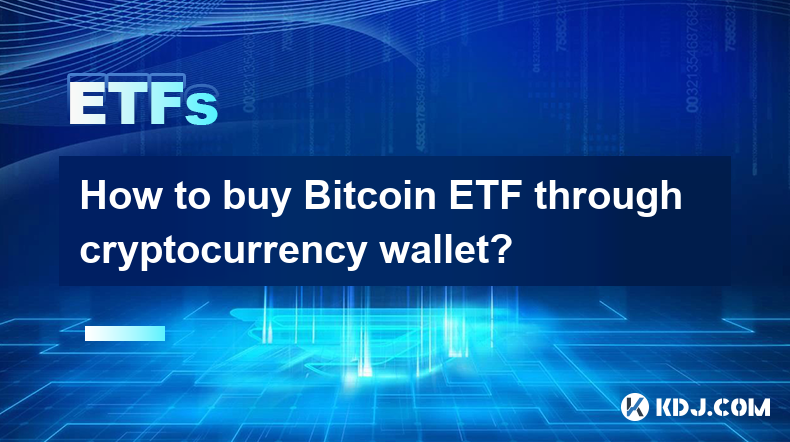
How to buy Bitcoin ETF through cryptocurrency wallet?
Mar 30,2025 at 08:22pm
It's important to understand that you cannot directly buy a Bitcoin ETF through a cryptocurrency wallet. Cryptocurrency wallets are designed to hold and manage digital assets like Bitcoin itself, not exchange-traded funds (ETFs). Bitcoin ETFs are traded on traditional stock exchanges, not decentralized cryptocurrency exchanges. Therefore, the process i...
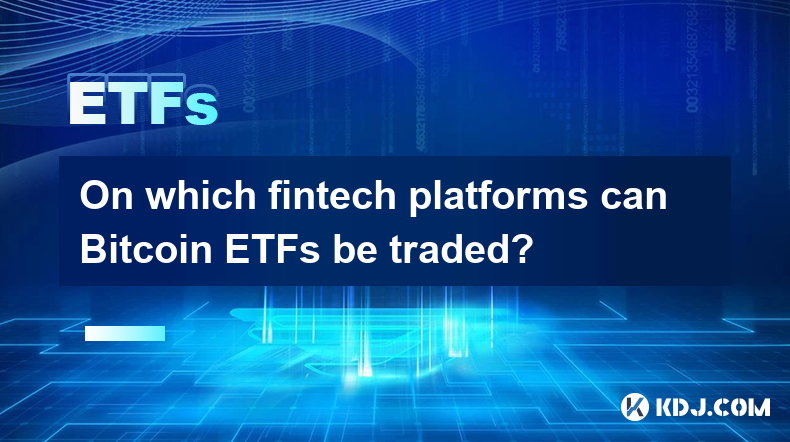
On which fintech platforms can Bitcoin ETFs be traded?
Mar 28,2025 at 09:21am
Navigating the Bitcoin ETF Landscape on Fintech PlatformsThe availability of Bitcoin ETFs on fintech platforms is a rapidly evolving landscape. Currently, the approval and subsequent listing of Bitcoin ETFs are subject to regulatory hurdles and vary significantly by jurisdiction. Therefore, the specific platforms offering Bitcoin ETF trading depend hea...
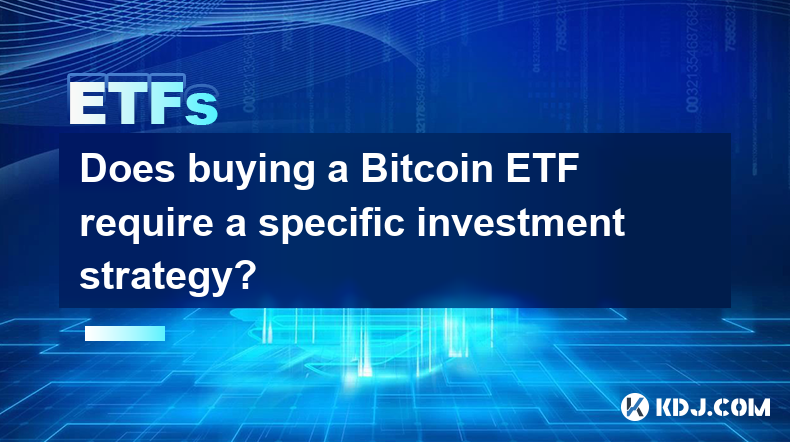
Does buying a Bitcoin ETF require a specific investment strategy?
Mar 27,2025 at 06:36pm
Understanding Bitcoin ETFs and Investment StrategiesA Bitcoin Exchange-Traded Fund (ETF) is a type of investment fund that tracks the price of Bitcoin. Investing in a Bitcoin ETF offers exposure to the cryptocurrency market without the complexities of directly owning and securing Bitcoin. However, like any investment, a successful strategy requires car...
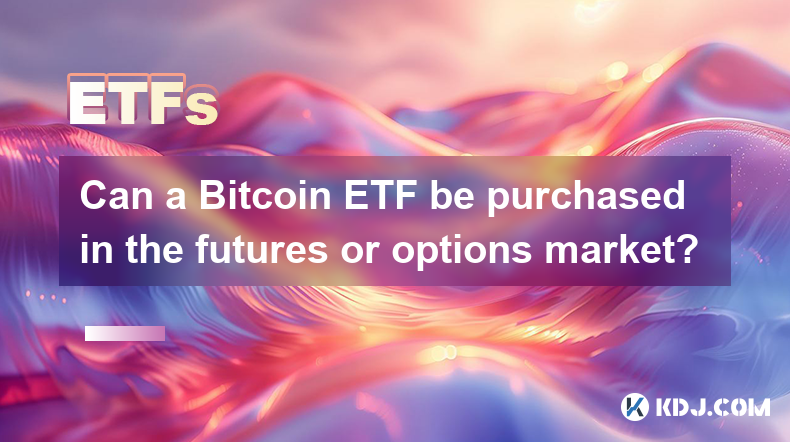
Can a Bitcoin ETF be purchased in the futures or options market?
Mar 27,2025 at 02:49am
Understanding Bitcoin ETFs and Derivative MarketsA Bitcoin ETF (Exchange-Traded Fund) is a fund that tracks the price of Bitcoin. Unlike directly buying Bitcoin, an ETF offers a more regulated and accessible way for investors to gain exposure to the cryptocurrency market through traditional brokerage accounts. However, the availability of a Bitcoin ETF...
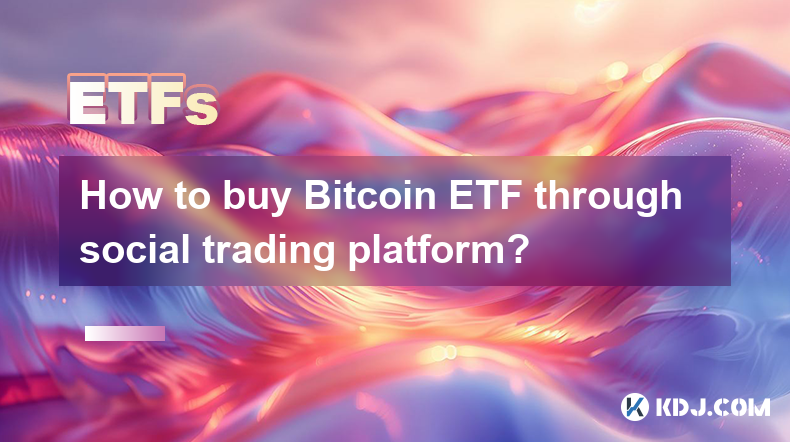
How to buy Bitcoin ETF through social trading platform?
Mar 27,2025 at 10:43am
How to Buy Bitcoin ETF Through Social Trading Platforms? Understanding Bitcoin ETFs and Social TradingA Bitcoin ETF (Exchange-Traded Fund) is a fund that tracks the price of Bitcoin. Unlike directly buying Bitcoin, an ETF offers a regulated and potentially less volatile way to gain exposure to the cryptocurrency market. This is because ETFs are traded o...
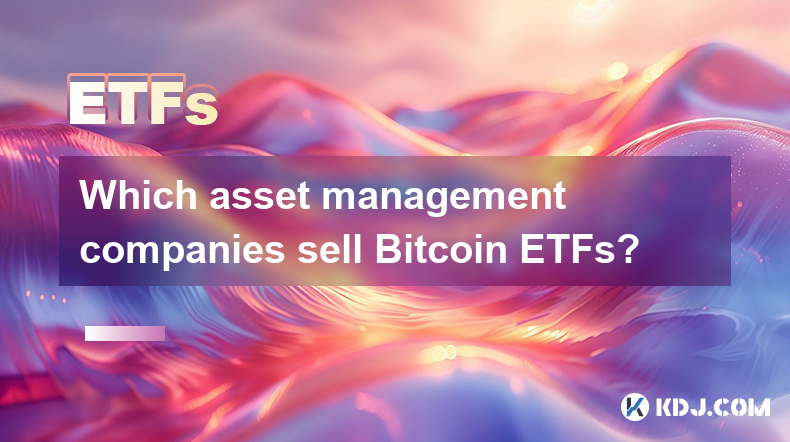
Which asset management companies sell Bitcoin ETFs?
Mar 28,2025 at 02:21am
The Current Landscape of Bitcoin ETF OfferingsCurrently, no asset management company offers a fully-fledged, SEC-approved Bitcoin ETF in the United States. While several companies have filed applications, the Securities and Exchange Commission (SEC) has yet to approve any. This is primarily due to concerns surrounding market manipulation, investor prot...

How to buy Bitcoin ETF through cryptocurrency wallet?
Mar 30,2025 at 08:22pm
It's important to understand that you cannot directly buy a Bitcoin ETF through a cryptocurrency wallet. Cryptocurrency wallets are designed to hold and manage digital assets like Bitcoin itself, not exchange-traded funds (ETFs). Bitcoin ETFs are traded on traditional stock exchanges, not decentralized cryptocurrency exchanges. Therefore, the process i...

On which fintech platforms can Bitcoin ETFs be traded?
Mar 28,2025 at 09:21am
Navigating the Bitcoin ETF Landscape on Fintech PlatformsThe availability of Bitcoin ETFs on fintech platforms is a rapidly evolving landscape. Currently, the approval and subsequent listing of Bitcoin ETFs are subject to regulatory hurdles and vary significantly by jurisdiction. Therefore, the specific platforms offering Bitcoin ETF trading depend hea...

Does buying a Bitcoin ETF require a specific investment strategy?
Mar 27,2025 at 06:36pm
Understanding Bitcoin ETFs and Investment StrategiesA Bitcoin Exchange-Traded Fund (ETF) is a type of investment fund that tracks the price of Bitcoin. Investing in a Bitcoin ETF offers exposure to the cryptocurrency market without the complexities of directly owning and securing Bitcoin. However, like any investment, a successful strategy requires car...

Can a Bitcoin ETF be purchased in the futures or options market?
Mar 27,2025 at 02:49am
Understanding Bitcoin ETFs and Derivative MarketsA Bitcoin ETF (Exchange-Traded Fund) is a fund that tracks the price of Bitcoin. Unlike directly buying Bitcoin, an ETF offers a more regulated and accessible way for investors to gain exposure to the cryptocurrency market through traditional brokerage accounts. However, the availability of a Bitcoin ETF...

How to buy Bitcoin ETF through social trading platform?
Mar 27,2025 at 10:43am
How to Buy Bitcoin ETF Through Social Trading Platforms? Understanding Bitcoin ETFs and Social TradingA Bitcoin ETF (Exchange-Traded Fund) is a fund that tracks the price of Bitcoin. Unlike directly buying Bitcoin, an ETF offers a regulated and potentially less volatile way to gain exposure to the cryptocurrency market. This is because ETFs are traded o...

Which asset management companies sell Bitcoin ETFs?
Mar 28,2025 at 02:21am
The Current Landscape of Bitcoin ETF OfferingsCurrently, no asset management company offers a fully-fledged, SEC-approved Bitcoin ETF in the United States. While several companies have filed applications, the Securities and Exchange Commission (SEC) has yet to approve any. This is primarily due to concerns surrounding market manipulation, investor prot...
See all articles























































































